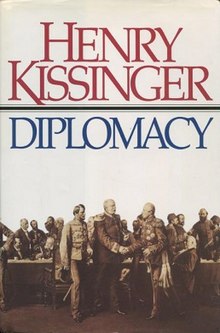Diplomacy(Kissinger book)
This articleneeds additional citations forverification.(September 2023) |
 First edition | |
| Author | Henry Kissinger |
|---|---|
| Language | English |
| Subject | Diplomacy |
| Publisher | Simon & Schuster |
Publication date | 1994 |
| Publication place | United States |
| Pages | 912 |
| ISBN | 0-671-51099-1 |
| OCLC | 32350622 |
Diplomacyis a 1994 book written by formerUnited States National Security AdvisorandSecretary of StateHenry Kissinger.
Summary[edit]
It is a sweep of the history ofinternational relationsand the art ofdiplomacythat largely concentrates on the 20th century and theWestern World.Kissinger, as a great believer in therealist school(realism) of international relations, focuses strongly on the concepts of thebalance of powerin Europe prior toWorld War I,raison d'ÉtatandRealpolitikthroughout the ages of diplomatic relations. Kissinger also provides critiques of the counterrealistdiplomatic tactics ofcollective security,which was developed in the Charter of theLeague of Nations,andself-determination,which was also a principle of the League. Kissinger also examines the use of thesphere of influencearguments put forth by theSoviet Unionin Eastern and Southern Europe afterWorld War II,an argument that has been maintained by contemporary Russian foreign relations with regard toUkraine,Georgiaand other former Soviet satellites inCentral Asia.
The history begins in Europe in the 17th century but quickly advances up to the World Wars and then theCold War.Kissinger refers to himself numerous times in the book, especially when he recounts theRichard NixonandGerald Fordpresidencies. The book ends with the argument that the US after the Cold War world should return to European style realpolitik and abandon Wilsonian idealism for it is a must if America is willing to survive—they must adhere to tough choices which conforms to the reality of the situation, not some sort of grasping the situation that they are in with a touch of utopic vision.[1]But he cautioned that the realpolitik is not some sort of an automatic 'cure-all' for all the diplomatic or political feuds.[2]
Kissinger dedicated the book to the men and women of theUnited States Foreign Service.
Praise[edit]
In aNew York Timesreview the book was likened to Machiavelli's classic 'Discourses' and predicted that in future it will be read, like Machiavelli's book, "for its wisdom".[3]
Criticism[edit]
The book has been target of criticism for historical inaccuracies.[3]
Chapters[edit]
- The New World Order
- The Hinge:Theodore RooseveltorWoodrow Wilson
- From Universality to Equilibrium:Richelieu,William of Orange,andPitt
- TheConcert of Europe:Great Britain, Austria, and Russia
- Two Revolutionaries:Napoleon IIIandBismarck
- Realpolitik Turns on Itself
- A Political Doomsday Machine: European Diplomacy Before theFirst World War
- Into the Vortex: The Military Doomsday Machine
- The New Face of Diplomacy: Wilson and theTreaty of Versailles
- The Dilemmas of the Victors
- Stresemannand the Re-emergence of the Vanquished
- The End of Illusion:Hitlerand the Destruction of Versailles
- Stalin's Bazaar
- TheNazi-Soviet Pact
- America Re-enters the Arena:Franklin Delano Roosevelt
- Three Approaches to Peace: Roosevelt, Stalin, andChurchillin World War II
- The Beginning of theCold War
- The Success and the Pain ofContainment
- The Dilemma of Containment: TheKorean War
- Negotiating with the Communists:Adenauer,Churchill, andEisenhower
- Leapfrogging Containment: TheSuez Crisis
- Hungary:Upheavalin the Empire
- Khrushchev's Ultimatum: TheBerlin Crisis 1958-63
- Concepts of Western Unity:Macmillan,de Gaulle,Eisenhower, andKennedy
- Vietnam: Entry into the Morass;Trumanand Eisenhower
- Vietnam: On the Road to Despair; Kennedy, andJohnson
- Vietnam: The Extrication;Nixon
- Foreign Policy as Geopolitics: Nixon's Triangular Diplomacy
- Détenteand Its Discontents
- TheEnd of the Cold War:ReaganandGorbachev
- TheNew World OrderReconsidered
A leather-bound, gold-embossed edition of the book was published by theEaston Pressand signed by Kissinger.
The book appears in the filmMuppet Treasure Island,in which The Great Gonzo pulls it out of Billy Bones' sea chest.
References[edit]
- ^Kissinger p. 836
- ^Kissinger, p. 834
- ^ab"Kissinger's 'Diplomacy'".The New York Times.May 1994.
- Kissinger, Henry.Diplomacy.New York: Simon & Schuster, 1994.ISBN0-671-51099-1
